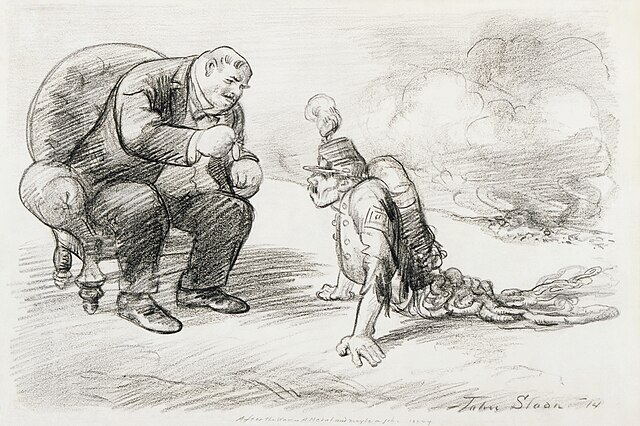On This Day in Rotten History...
In 1865 – (152 years ago) – President Abraham Lincoln died in a first-floor bedroom at a boarding house across the street from Ford’s Theatre in Washington, DC, where he had been shot in the head by the actor John Wilkes Booth the previous evening. Even before moving Lincoln out of the theater, doctors on the scene had already reached the conclusion that the bullet wound in his skull was mortal, and that he would surely die. The bed in the boarding house was too short to accommodate Lincoln’s tall frame, so they had to lay him on it diagonally. Lincoln died in a room full of people; he was surrounded by doctors and government officials. His twenty-six-year-old assassin, a Confederate sympathizer who had called slavery an important institution that should be preserved, had escaped the scene and was still at large.
In 1912 – (105 years ago) – more than 1,500 people died when the RMS Titanic, a great passenger liner making its maiden voyage, sank in the North Atlantic about two hours after hitting an iceberg. The Titanic had been hyped as the largest and most luxurious ship in the world, and though it boasted some of the most advanced safety features of its time, it only carried enough lifeboats for half the number of people on board. About 700 passengers survived, but experts agree that many more could have been saved if some of the lifeboats had not been launched half empty, and if the ship’s crew had been properly trained in their use. Of the rich people traveling in first class, near the top of the ship, 62 percent survived. Of the less affluent passengers down in third-class steerage, only 37 percent made it out alive.
In 1989 – (28 years ago) – a total of 96 people were killed and 776 injured in a human crush at the Hillsborough soccer stadium in Sheffield, England. It was the FA Cup semifinal between Liverpool and Nottingham Forest, and as fans of the Liverpool side herded into a large standing-room-only pen to watch the action, they were unaware that the crowd inside had already reached the pen’s capacity. As fans inside the pen were crushed and became piled on top of each other, some tried desperately to crawl out of the pen, over the fence, and onto the soccer field. As the situation grew more dangerous, referees stopped the game after just five minutes of playing time. In the aftermath of the disaster, several... read more
Listen live from 9AM - 1:00PM Central on WNUR 89.3FM / stream at www.thisishell.com / subscribe to the podcast
9:10 - Live from Serbia, Todd Williams reports on mass protest movements in Belgrade and Budapest.
Todd will be reporting from Novi Sad where he's on Easter vacation.
9:40 - Journalist Jamie Peck watches the Democratic Party establishment double down on centrism.
Jamie wrote the Guardian op-ed The Democratic party is undermining Bernie Sanders-style candidates.
10:10 - Writers Zoé Samudzi and William C. Anderson explore the anarchism of Blackness in America.
Zoé and William wrote the essay The Anarchism of Blackness for ROAR Magazine.
11:05 - Author Mary Otto explains what our teeth say about capitalism, inequality and healthcare.
Mary is author of Teeth: The Story of Beauty, Inequality, and the Struggle for Oral Health in America from The New Press.
12:05 - Cultural critic Henry Giroux examines the culture of cruelty at the heart of American politics.
Henry wrote the article The Culture of Cruelty in Trump's America for Truthout.
12:45 - In a very genuine Moment of Truth, Jeff Dorchen mocks our authenticity fetish.
Objectionable Objectivism
Welcome to the Moment of Truth: the thirst that is the drink.
I'm reading the biography of one of the most famous surfers of all time. I'm going to be cryptic about his identity, for no reason in particular. He was nicknamed "Da Cat," among other things, including "a-hole." He's dead now of pancreatic cancer. The cause of his death probably had little to do with how he lived his life. He used a lot of lotion, even on his pancreas.
The biography opens with three quotations, only one of which did Da Cat employ habitually: "I do not recognize anyone's right to pilfer one minute of my life, nor to any achievement of mine, no matter who makes the claim, how large their number, or how great their need." That's from Ayn Rand's classic hunk of airport toilet paper, The Fountainhead.
Allow me to share with you my feelings about Ayn Rand. She was a pig, and I'm not referring to her appearance. It could be said, however, that she resembled what one could imagine Howard Cosell might look like after a six-month juice fast and a hanging. Among her sycophantic followers there were several who had sexual intercourse with her, and many others who wished to. If there were a sex act that could justifiably be abolished by law, it would be any type of intimate congress with Rand. I wouldn't schtup her with Ann Coulter's wang, but that's beside the point. She was a repulsive thinker and a lousy writer. And I say this as someone who forgives a great deal of lousy writing and lousy thinking, some of it even by authors other than myself.
Rand was such a lousy, doggedly crappy writer, that the fact the quotation in question is not from an essay but rather from the mouth of one of her characters makes no difference. Howard Roarke, the incendiary architect played in the slightly less crappy movie by Gary Cooper, is the mouthpiece for Rand, uncleverly designed to represent as well as spout her idiotic, self-serving philosophy of Objectivism.
I will now maliciously misrepresent Rand's philosophy. After all, whether she recognized my right to pilfer it for these purposes or not, the fact is, in a very real sense, cosmic and fundamental, I have that right, whether she choses to recognize it or not. That she didn't recognize it is simple proof, cosmic and fundamental, of the weakness of her ideas. What a dumbbell.
Objectivism is the notion that the world is made up of objects which belong to whoever finds... read more
Listen live from 9AM - 1:00PM Central on WNUR 89.3FM / stream at www.thisishell.com / subscribe to the podcast
9:15 - Writer Laurie Penny traces the Brexit shock to a long, drab decade of austerity culture in the UK.
Laurie wrote the article Brexit, Pursued by Despair for The Baffler.
10:00 - Live from São Paulo, Brian Mier reports on the wave of strikes against neoliberal cuts in Brazil.
Brian published the piece “There is no negotiation whatsoever”: Union leader Douglas Izzo talks about labor rights in post-coup Brazil for Brasil Wire.
10:35 - The Radical Pessimist, Kevan Harris explores the myth of the bootstrapping European immigrant.
Kevan's first book A Social Revolution: Politics and the Welfare State in Iran is out this August. Proud of our boy.
11:05 - Sociologist Thomas Shapiro explains how racial wealth inequality threatens democracy in America.
Thomas is author of Toxic Inequality: How America's Wealth Gap Destroys Mobility, Deepens the Racial Divide, and Threatens Our Future from Basic Books.
12:05 - Writer Thomas Frank explains how the Democratic Party stopped working for American workers.
Thomas will be talking about the new, post-election edition of his still right book Listen Liberal: Or, Whatever Happened to the Party of the People? from Picador.
12:45 - In a Moment of Truth, Jeff Dorchen wonders if he's actually a Randian at heart.
Objectively.
Dateline Pas Ris
Welcome to the Moment of Truth: the thirst that is the drink.
If I remember correctly (but to be honest it really doesn't matter if I do), according to the great author François Rabelais, Paris was founded when a mischievous giant urinated on a village of people who had irked him. They became known as the village that had been peed on, and would greet visitors from outside with the plea, "pas ris" – don't laugh. Never mind that the normal grammatical construction is "ris pas" – I come by this information via Rabelais, who was nothing if not a faithful historian.
"Don't laugh at us" implore the Parisians. I'm still trying to figure out if it's possible to comply. As a guest in this burg, I have no wish to offend my hosts. But they are quite risible at times. Donc, je pense que pour eviter de rire n'sera pas possible.
But if I weren't laughing, I'd be crying. See, no one here seems to believe that Marine le Pen has a chance of becoming the next leader of France, which, should it happen, I feel would lead to the kind of emboldening of violent rightwing behavior we've been seeing in the US. We talk about the Trump surprise, and the Brexit surprise, and they're aware of the "sensible" population's failure to predict those two recent political disasters, but at all the bars and cafes in the Montreuil and St Blaise, when I talk to working-class drunks or younger, hipper drunks, no one seems to harbor the slightest trepidation.
Which of course terrifies me. But at least I'm not laughing.
Everyone seems ready to admit that the conditions for such a rightwing populist spasm are similar here to those in the US and UK just before the unpleasantness. I don't even have to bring it up. Bien sur, they say. The socialist party is no longer socialist here, and hasn't been for the longest time, just as the Democratic party in the USA hasn't been much of a champion of the demos, nor has the UK's Labor party been much of a force for labor.
And if there's no polite, progressive way to express that Muslim immigrants might be a problem, the left do not hesitate to attempt it. In this neighborhood, where the workers are still cursing the bosses as vehemently as in the old days, and have no trouble pointing out the financial class's culpability in their economic troubles, and Muslims, especially those from North Africa, are well-integrated as fellow drinkers and fellow workers, there's still... read more
On This Day in Rotten History...
In 1911 – (106 years ago) – A total of 123 women and 23 men were killed in one of the deadliest industrial fires in US history. The Triangle Shirtwaist Factory, which manufactured women’s blouses, occupied the top three floors of a building in Greenwich Village, New York. Though smoking was not allowed, some workers snuck cigarettes on the job, and it’s believed that someone may have tossed a smouldering match or butt into a waste bin full of cotton scrap. Either that, or one of the sewing machines caused an electric spark. In rooms full of flammable cloth, the fire spread fast, but the workers soon found that some exits were blocked by flames, while others had been locked shut to keep anyone from stealing fabric or taking unauthorized work breaks. Fire trucks arrived quickly, but their ladders could not reach the building’s upper floors. After the elevators failed and a poorly maintained external fire escape collapsed, the desperate workers began jumping from the windows, to die as they hit the concrete sidewalks below. In age they ranged from fourteen to forty-three, and most were recent Jewish or Italian immigrants.
In 1947 – (70 years ago) – in Centralia, Illinois, one hundred eleven people died in a coal mine explosion, caused by combustion of heavy coal dust buildup in the underground tunnels. This danger and others had been cited repeatedly by inspectors, and miners’ union reps had taken their protests as high as the office of the Illinois governor — but the problem was not properly addressed by the mine company management or by state regulators. One hundred forty-two miners were in the mine when it blew up. Of the thirty-one who came out alive, many immediately went back down to help rescue their colleagues. During those rescue operations, state mining director Robert Medill almost caused a violent uprising by ordering that electric power be turned back on, to speed up the work and get the mine back on line. But state inspectors quickly shut him down, with evidence that doing so could have caused another explosion. The governor fired Medill a week later. The mine disaster inspired a song by Woody Guthrie.
Rotten History is written by Renaldo Migaldi






